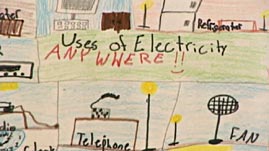Teachers' Domain - Digital Media for the Classroom and Professional Development
User: Preview

Source: WGBH Educational Foundation


Successful science teaching often requires good assessment. Assessments may conclude a lesson, while others occur before or during the lesson itself.
Science practices involve a host of skills, attitudes, and knowledge. They may range from setting up a fair experiment, to prediction, observation, and reflection on the process. The teaching of these skills can give elementary students a foundation on which to build in higher-level science classes.
However, in order to evaluate the effectiveness of teaching such skills and content, assessment is necessary to map out progress. It can also help identify gaps or shortcomings in a teacher’s approach.
This video shows Linda Block teaching a lesson for her unit “Completing the Circuit.” She prepares her lesson on electrical circuits by gauging her students’ background knowledge in several ways. Preliminary assessments vary and can include those Block relates in this video: a questionnaire and posters created by students about what they know prior to the lesson.
Testing students’ skills and knowledge for the lesson to come is a good way to gain a sense of existing gaps that need to be addressed in the lesson. Such assessments can therefore inform how lessons are taught, or alternately, how well they account for students’ needs. With these tools, teachers can gain information on their teaching approaches and their students’ learning styles. From there, a teacher can make improvements to the overall educational experience in the classroom.
 Loading Standards
Loading Standards